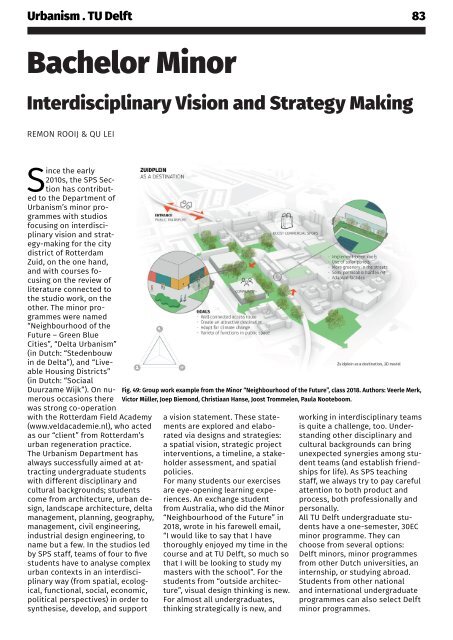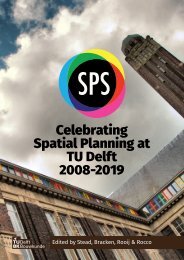*Celebrating Spatial Planning at TU Delft: 2008-2019. Edited by Stead, Bracken, Rooij & Rocco
This is a summary of the achievements of the session Spatial Planning & Strategy of the Department of Urbanism, Faculty of Architecture and the Built Environment, TU Delft, led by Professor Vincent Nadin between 2008 and 2019.
This is a summary of the achievements of the session Spatial Planning & Strategy of the Department of Urbanism, Faculty of Architecture and the Built Environment, TU Delft, led by Professor Vincent Nadin between 2008 and 2019.
You also want an ePaper? Increase the reach of your titles
YUMPU automatically turns print PDFs into web optimized ePapers that Google loves.
Urbanism . <strong>TU</strong> <strong>Delft</strong> 83<br />
Bachelor Minor<br />
Interdisciplinary Vision and Str<strong>at</strong>egy Making<br />
REMON ROOIJ & QU LEI<br />
Since the early<br />
2010s, the SPS Section<br />
has contributed<br />
to the Department of<br />
Urbanism’s minor programmes<br />
with studios<br />
focusing on interdisciplinary<br />
vision and str<strong>at</strong>egy-making<br />
for the city<br />
district of Rotterdam<br />
Zuid, on the one hand,<br />
and with courses focusing<br />
on the review of<br />
liter<strong>at</strong>ure connected to<br />
the studio work, on the<br />
other. The minor programmes<br />
were named<br />
“Neighbourhood of the<br />
Future – Green Blue<br />
Cities”, “Delta Urbanism”<br />
(in Dutch: “Stedenbouw<br />
in de Delta”), and “Liveable<br />
Housing Districts”<br />
(in Dutch: “Sociaal<br />
Duurzame Wijk”). On numerous<br />
occasions there<br />
was strong co-oper<strong>at</strong>ion<br />
with the Rotterdam Field Academy<br />
(www.veldacademie.nl), who acted<br />
as our “client” from Rotterdam’s<br />
urban regener<strong>at</strong>ion practice.<br />
The Urbanism Department has<br />
always successfully aimed <strong>at</strong> <strong>at</strong>tracting<br />
undergradu<strong>at</strong>e students<br />
with different disciplinary and<br />
cultural backgrounds; students<br />
come from architecture, urban design,<br />
landscape architecture, delta<br />
management, planning, geography,<br />
management, civil engineering,<br />
industrial design engineering, to<br />
name but a few. In the studios led<br />
<strong>by</strong> SPS staff, teams of four to five<br />
students have to analyse complex<br />
urban contexts in an interdisciplinary<br />
way (from sp<strong>at</strong>ial, ecological,<br />
functional, social, economic,<br />
political perspectives) in order to<br />
synthesise, develop, and support<br />
Fig. 49: Group work example from the Minor “Neighbourhood of the Future”, class 2018. Authors: Veerle Merk,<br />
Victor Müller, Joep Biemond, Christiaan Hanse, Joost Trommelen, Paula Nooteboom.<br />
a vision st<strong>at</strong>ement. These st<strong>at</strong>ements<br />
are explored and elabor<strong>at</strong>ed<br />
via designs and str<strong>at</strong>egies:<br />
a sp<strong>at</strong>ial vision, str<strong>at</strong>egic project<br />
interventions, a timeline, a stakeholder<br />
assessment, and sp<strong>at</strong>ial<br />
policies.<br />
For many students our exercises<br />
are eye-opening learning experiences.<br />
An exchange student<br />
from Australia, who did the Minor<br />
“Neighbourhood of the Future” in<br />
2018, wrote in his farewell email,<br />
“I would like to say th<strong>at</strong> I have<br />
thoroughly enjoyed my time in the<br />
course and <strong>at</strong> <strong>TU</strong> <strong>Delft</strong>, so much so<br />
th<strong>at</strong> I will be looking to study my<br />
masters with the school”. For the<br />
students from “outside architecture”,<br />
visual design thinking is new.<br />
For almost all undergradu<strong>at</strong>es,<br />
thinking str<strong>at</strong>egically is new, and<br />
working in interdisciplinary teams<br />
is quite a challenge, too. Understanding<br />
other disciplinary and<br />
cultural backgrounds can bring<br />
unexpected synergies among student<br />
teams (and establish friendships<br />
for life). As SPS teaching<br />
staff, we always try to pay careful<br />
<strong>at</strong>tention to both product and<br />
process, both professionally and<br />
personally.<br />
All <strong>TU</strong> <strong>Delft</strong> undergradu<strong>at</strong>e students<br />
have a one-semester, 30EC<br />
minor programme. They can<br />
choose from several options:<br />
<strong>Delft</strong> minors, minor programmes<br />
from other Dutch universities, an<br />
internship, or studying abroad.<br />
Students from other n<strong>at</strong>ional<br />
and intern<strong>at</strong>ional undergradu<strong>at</strong>e<br />
programmes can also select <strong>Delft</strong><br />
minor programmes.




